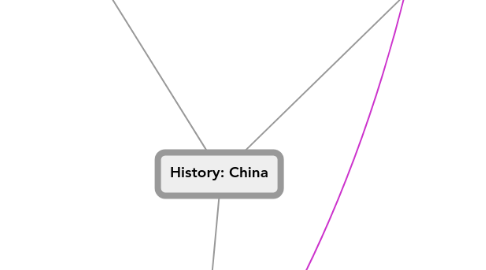
1. sino-Japanese war
1.1. Japan (surrendered on 14th August 1945
1.1.1. Kwantung Army
1.1.1.1. Japanese army posted in Machuria to guard South Machuria railway and other Japanese interests
1.1.1.1.1. Manchukuo
1.1.1.1.2. South Manchuria Railway
1.1.1.2. It was acting increasingly out of authorization from the government
1.1.1.3. Assasinated Zhou Zuolin (1928)
1.1.2. Ichigo Offensive
1.1.2.1. Majorly successful offensive
1.1.2.2. Japan troops became outstreched
1.1.2.3. GMD blamed for their incompetence both by USA and its own people
1.1.3. Rape of Nanking
1.1.3.1. A priod of six weeks after Japan ccupied Nanking
1.1.3.2. Mass rape and murder
1.1.3.3. around 300,000 were killed
1.1.4. Three All Campaign
1.1.4.1. response to CCP's HUndred Regiment's battle
1.1.4.2. 杀光,烧光,砍光
1.1.4.3. Made the Japanese infamous not just among the Chinese but also the foreign powers
1.1.5. Marco Polo Bridge Incident
1.1.5.1. Clash between Chinese and Japanese troops
1.1.5.2. Became Japan's excuse for occupying Beijing
1.1.5.3. Chiang Kaishek refused to give in, so a full scale war broke out between China and Japan
1.2. China
1.2.1. GMD
1.2.1.1. Marco Polo Brdige Incident
1.2.1.2. Ichigo Offensive
1.2.2. CCP
1.2.2.1. Liberation Areas
1.2.2.1.1. countrysides where CCP controlled
1.2.2.2. Red Army
1.2.2.2.1. CCP‘s army, which was run differently as the soldiers and the officers receives the same pay
1.2.3. Joint forces
1.2.3.1. First United Front (1923-1927)
1.2.3.2. Second United Front (1937-1944)
1.2.3.2.1. alience of CCP with GMD to fight the Japanese
1.2.3.2.2. Nominally led by Jiang Jieshi, in practice, GMD operated seperated
1.2.3.2.3. Was forced in the Xian Incidence
1.2.4. ordinary citizens
1.2.4.1. May 4 Movement
1.2.4.1.1. Boycott
1.2.4.1.2. Led by students and city people
1.2.4.1.3. Protest to the Treaty of Vassailes because Japanese had the right to owned Shandong
1.2.4.1.4. This drove Japanese troops out of Shandong and allowed Communists to set up a base there
1.3. Other foreign powers
1.3.1. Atomic Bombs
1.3.1.1. Hiroshima 6th August 1945
1.3.1.2. Nagasaki 9th Auguest 1945
1.3.1.3. Hastened Japanese surrender
1.3.2. Lytton Commission
1.3.2.1. An organisation set up by League of Nation
1.3.2.2. Took some action in 1933
1.3.2.3. Japan reacted by walking out of League of Nations and no more actions were taken
1.3.3. USSR Declares War on Japan
1.3.3.1. 8th August 1945
1.3.3.2. Handed the captured Japanese weapons to CCP instead of GMD, helped them to win the civil war
2. 中华民国
2.1. Foreign Concessions
2.1.1. extended foreign embassies
2.1.2. This was resented by many
2.1.3. extraterritoriality
2.1.3.1. the right for foreigners not to obey Chinese laws but their own legislations
2.2. Wuchang uprising
2.2.1. October 10th 1911
2.2.2. Marked the end of Qing dynasty
2.2.3. Chongqing
2.2.3.1. The capital after Wuhan where GMD based
2.2.3.2. Japan could not reach there
2.2.3.3. Nor can the GMD get enough supplies
2.3. Guomingdang
2.3.1. Officers trained in Whampoa Military Academy
2.3.2. Money came from Comintern
2.4. Warloards
2.4.1. Generals and military governers who took over large areas between 1917 to 1928
2.4.2. Many were bad rulers and people were exploited under them
3. Civil War
3.1. Chinese Communist Party
3.1.1. 1. formed by uniting a number of Marxist study groups; 2. first meeting held in a girl's school; 3. Mao was there but not yet a leading member
3.1.1.1. Zhou Enlai
3.1.1.1.1. This person, 28 Bolsheviks and Otto Braun dominated CCP until 1934, they were heavily influeced by the comintern and the Russian model of Communism
3.1.1.1.2. Zunyi Conference
3.1.1.1.3. Helped negotiating the Second United Front with Zhang Xuelang
3.1.1.2. Zhu De
3.1.1.2.1. Led the Jiangxi Soviet with Mao
3.1.1.2.2. Brilliant general who was a founder of the Red Army
3.1.1.2.3. Close associate to Mao, helped him greatly to come to power
3.1.1.2.4. Credited for the successful guerilla tactics
3.1.1.2.5. Ransacked during 'Cultural Revolution' and became the "black general"
3.1.1.3. The Long March 1934-1935
3.1.1.3.1. Retreat by CCP to Yan'an
3.1.1.3.2. marched over 600 miles, only around 25% made it
3.1.1.3.3. Marked CCP union and spread Communist ideas
3.1.1.3.4. Marked the leadership of Mao
3.1.1.4. Jiangxi Soviet
3.1.1.4.1. 1928-1934=communist base, led by Mao Zedong and Zhu De
3.1.1.4.2. Carried out a number of reforms to demonstrate how communists would rule
3.1.1.4.3. Mao became 'head of the state' (not head of the party)
3.1.1.4.4. 'Futian Incident' - a bloody purge organised by Mao aiming to clear out all the GMD in the area
3.1.1.4.5. Extermination campagins
3.1.1.5. Communist Bases
3.1.1.5.1. Areas out of GMD's control during GMD's decade
3.1.1.5.2. Battles were fought continuously in these areas
3.1.1.5.3. E.g.: Jiangxi and then Yan'an
3.1.2. Comintern
3.1.2.1. An international allience of communist parties
3.1.2.2. Run by Moscow
3.1.2.3. In1923 persuaded GMD to join forces with CCP (first united front)
3.2. Guomingdang
3.2.1. Sun Zhongshan
3.2.1.1. formed Guo Mindang
3.2.1.2. Often called "nationalist" in Engish
3.2.1.3. Three People's Principles
3.2.1.3.1. Nationalism
3.2.1.3.2. Republicanism
3.2.1.3.3. People's livelihood (socialism)
3.2.2. Jiang Jieshi
3.2.2.1. Succeeded Sun Zhongshan
3.2.2.2. Sutdied abroad in USSR, took up his dislikes for Communists there
3.2.2.3. Ruled as a dictator
3.2.2.4. Northern Expedition
3.2.2.5. Extermination campaigns
3.2.2.5.1. Five in total
3.2.2.5.2. Exterminating the Jiangxi Soviet
3.2.2.5.3. The GMD is in advantage comparing the number of soldiers and the equipments
3.2.2.5.4. CCP used guerilla tactics and managed to defeat the GMD
3.2.2.5.5. 5th extermination campaign
3.2.2.6. Shanghai Massacre 1927
3.2.2.6.1. Marked the end of the First United Front
3.2.2.6.2. With help from Shanghai gangsters, murdered every communist he could find
3.2.2.6.3. From this point till 1936 is the civil war
3.2.3. Zhang Xueliang
3.2.3.1. Xian Incident (December 1936)
3.2.3.1.1. Jiang Jieshi kidnapped and handed to the Communists
3.2.3.1.2. Second United front negotiated
3.2.3.1.3. Also means continued independency of warloards
3.2.3.1.4. propoganda victory for the Communists
3.2.3.2. Son of warloard, joined force with Guo Mindang after his father was killed by the Japanese
3.2.3.3. Believes that Jiang Jieshi should fight the Japanese, instead of CCP
